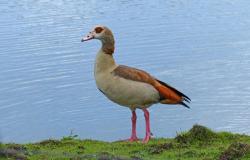Today
•
reading time 2 minutes
50 views
•
save
The four-band grooving bee
© Vroege Vogels TV
In the Netherlands, more and more plant species that depend on insect pollination are disappearing. This is evident from a major study by Leiden University. “75% percent of our crops and 90% of wild plants depend on insects,” the researchers said. “That is disturbing news for our biodiversity and food security.”
The results come from an analysis of 87 years of measurements at more than 365,000 locations. These show that the declining number of insects in the Netherlands has a major impact on the plants that depend on them for pollination. “We see that the number of insect-pollinated plant species is decreasing, while the number of wind-pollinated species is increasing,” says researcher Kaixuan Pan. “There are therefore fewer and fewer insect-pollinated plants.”
Species dependent on insect pollination
More wind pollination does not compensate for the reduction in insect pollination. A large number of plant species in the Netherlands are really dependent on pollination by insects. “If these plants disappear from the landscape, it not only means that there are fewer plant species left, but also that there are far fewer seeds and fruits for birds and other animals,” says Pan. “In other words: a sharp decline in biodiversity.” In addition, 75% of the crops we currently consume depend on insect pollination. “If we lose these species, it will threaten our food security.”
The decline in insect-pollinated plants is not solely due to factors such as humidity or nitrogen, because then wind-pollinated plants should show the same trends. “Under similar conditions, we often saw a greater reduction in the number of insect-pollinated species compared to wind-pollinated species,” says Pan. “That difference is most likely due to a lack of pollination: there are not enough pollinators left to fertilize these plants.”
Mutual dependence of insects
To turn the tide, various measures are needed, the scientists say. Ensuring that less nitrogen ends up in nature, for example, can help local plants and insects. Protecting natural grassland is also important. “Because that is where many of the plant species that have declined in recent years occur.”
Supervisor Koos Biesmeijer from Leiden University and Naturalis Biodiversity Center: “And we must continue to monitor to see whether these types of protection measures have the desired effect. Both the insects and the plants, because they are mutually dependent. This way we can learn from the past, monitor the present and change the future in a positive way.’
Source: Leiden University
Tags: Decline insectpollinated plants Netherlands Early Birds






